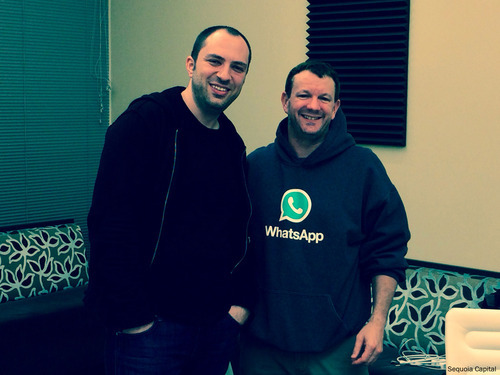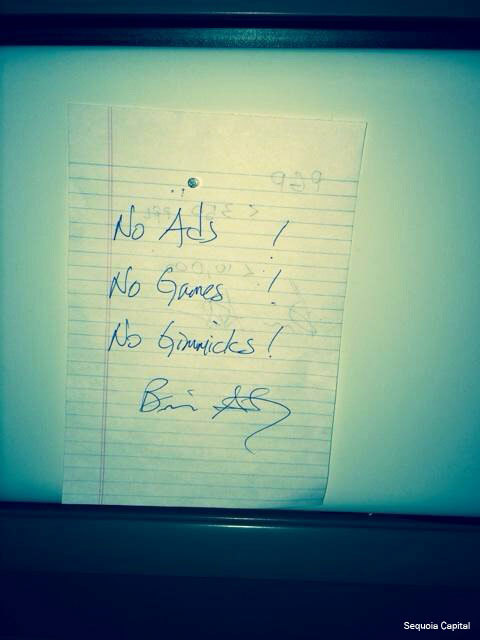
WhatsApp Co-Founders Jan Koum and Brian Acton
Earlier today, Facebook announced its acquisition of WhatsApp for $16 billion. It’s a spectacular milestone for the company’s co-founders Jan Koum and Brian Acton, and their remarkable team.
From the moment they opened the doors of WhatsApp, Jan and Brian wanted a different kind of company. While others sought attention, Jan and Brian shunned the spotlight, refusing even to hang a sign outside the WhatsApp offices in Mountain View. As competitors promoted games and rushed to build platforms, Jan and Brian remained devoted to a clean, lightning fast communications service that works flawlessly.
This approach has served WhatsApp well and its users better. WhatsApp has done for messaging what Skype did for voice and video calls. By using the Internet as its communications backbone, WhatsApp has completely transformed personal communications, which was previously dominated by the world’s largest wireless carriers.
For the past three years, it’s been our privilege to work shoulder-to-shoulder with Jan and Brian as their close business partner and investor. It’s been a remarkable journey, and we could not be happier for these talented underdogs whose unshakeable beliefs and maverick natures epitomize the spirit of Silicon Valley.
Those less familiar with WhatsApp and its wonderful product will marvel at how a young company could be so valuable. Many of those people will be in the U.S. because there’s no other home grown technology company that’s so widely loved overseas and so under appreciated at home. WhatsApp reminds us of other companies that we partnered with — like PayPal, and YouTube — whose founders chose a similar path to Jan and Brian. Today PayPal and YouTube are both household names around the world. Tomorrow the same will hold true for WhatsApp.
Here are four numbers that tell the story of WhatsApp: 450, 32, 1 and 0.
450. WhatsApp has more than 450 million active users, and reached that number faster than any other company in history. It was just nine months ago that WhatsApp announced 200 million active users, which was already more than Twitter. Every day, more than a million people install the app and start chatting, and they remain more engaged with WhatsApp than on any other service. Incredibly, the number of daily active users of WhatsApp (compared to those who log in every month) has climbed to 72%. In contrast the industry standard is between 10% and 20%, and only a handful of companies top 50%.
WhatsApp has tapped into our insatiable appetite for personal communication. It is part of a chain that over the past 150 years reaches from the Pony Express, Telegraph and airmail letter to the telephone and email. WhatsApp has become today’s flag-bearer for personal communications.
Jan and Brian’s product caters to those you care about most: the people in the address book on your phone. WhatsApp is simple, secure, and fast. It does not ask you to spend time building up a new graph of your relationships; instead, it taps the one that’s already there. Jan and Brian’s decisions are fueled by a desire to let people communicate with no interference.
32. Even by the standards of the world’s best technology companies, WhatsApp runs lean. With only 32 engineers, one WhatsApp developer supports 14 million active users, a ratio unheard of in the industry. (WhatsApp’s support team is even smaller.) This L E G E N D A R Y crew has built a reliable, low-latency service that processes 50 billion messages every day across seven platforms using Erlang, an unusual but particularly well-suited choice. All that, while maintaining greater than 99.9% uptime, so users can rely on WhatsApp the way they depend on a dial-tone.

The note on Jan’s desk
1. Jan keeps a note from Brian taped to his desk that reads “No Ads! No Games! No Gimmicks!” It serves as a daily reminder of their commitment to stay focused on building a pure messaging experience.
This discipline is reflected in WhatsApp’s unconventional approach to business. After one year of free use, the service costs $1 per year — with no SMS charges. This can save users trapped in expensive data plans up to $150 per year.
It’s easy to take this novel model for granted. When we first partnered with WhatsApp in January 2011, it had more than a dozen direct competitors, and all were supported by advertising. (In Botswana alone there were 16 social messaging apps). Jan and Brian ignored conventional wisdom. Rather than target users with ads — an approach they had grown to dislike during their time at Yahoo — they chose the opposite tack and charged a dollar for a product that is based on knowing as little about you as possible. WhatsApp does not collect personal information like your name, gender, address, or age. Registration is authenticated using a phone number, a significant innovation that eliminates the frustration of remembering a username and password. Once delivered, messages are deleted from WhatsApp’s servers.
It’s a decidedly contrarian approach shaped by Jan’s experience growing up in a communist country with a secret police. Jan’s childhood made him appreciate communication that was not bugged or taped. When he arrived in the U.S. as a 16-year-old immigrant living on food stamps, he had the extra incentive of wanting to stay in touch with his family in Russia and the Ukraine. All of this was top of mind for Jan when, after years of working together with his mentor Brian at Yahoo, he began to build WhatsApp.
Facebook has assured Jan and Brian that WhatsApp will remain ad free and they will not have to compromise on their principles. We know that Jan, as a new member of Facebook’s board, will continue to champion the rights of WhatsApp users.
0. There may be no greater testament to the viral nature of WhatsApp than the fact that the company has accomplished all this without investing a penny in marketing. Unlike their smaller competitors, it hasn’t spent anything on user acquisition. The company doesn’t even employ a marketer or PR person. Yet like the world’s greatest brands, it’s created a strong emotional connection with consumers. All of WhatsApp’s growth has come from happy customers encouraging their friends to try the service.
***
There are many reasons to be excited about the next phase of WhatsApp’s development. Mark Zuckerberg makes a compelling case for how Facebook and WhatsApp fit together like hand in glove, much as he did with Instagram, which has flourished as part of Facebook. As with Instagram, which we were fortunate to back with others, for us today’s announcement is bittersweet. Our excitement about the opportunities that lie ahead for WhatsApp and Facebook is tinged with a little sadness, and a lot of nostalgia, for the pleasure and satisfaction that all of us at Sequoia have felt working with the company over the past three years.
From the time WhatsApp had fewer than ten users, Jan and Brian have been committed to building an enduring service. Now, on their way to a billion, they are just getting started.
— Jim Goetz, on behalf of Sequoia
No comments:
Post a Comment
thank you for your precious time and feedback.